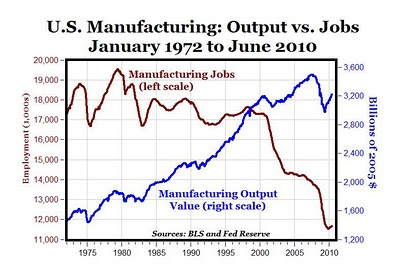This chart gives an opportunity to explain how a "Price Index" is calculated. Price Indexes are useful in that allows you to compare the change in prices over time of similar goods/services OR completely different categories of goods/services. Price Indexes are in the form of a base 100 format. I am going to skip the complicated math formula(s) that is(are) actually used to compile a price index and use a simple version.
The first step is to establish a base year for comparison. This chart uses a span of time from 2002-2004. Let's say the average price of sugar in that time was $1.00 per pound (completely made up price!). This is our base year price. To calculate the Base Year Price Index:
Current Year Price/Base Year Price X 100. Mulitplying by 100 puts the number in base 100 form.
$1.00 (current year price) / $1.00 (base year price) X 100 =
100.
In the base year, the current year price and the base year price are the same, so the base year Price Index will always be 100.
Assume after 1 year the price of sugar is $1.50 per pound. We use the same formula above and plug in the values:
$1.50 /$1.00 X 100 = 150. 150 is our Price Index for year 2. In subsequent years we do the same thing: take the current year price of our good/service and dividing it by the base year price then X 100.
Now you are informed enough to read the chart above. Sugar has a current price index of approx 425. So how much, in percentage terms, has the price of sugar increased? Is it 425%? The simple formula for calculating percentage change:
""Current Year Index - Base Year Index / Base Year Index X 100""
425 - 100 = 325. 325 divided by 100 = 3.25. 3.25 mulitlplied by 100 =
325%.
(
Note: Yes, In this example you could have skip a math step after the first calculation. Using the base year of 100 make this easy. However, if you were asked to calculate the percentage change between two years OTHER then the base year, this formula is necessary to work all the way through)
Quick short-cut: When you see a price index number (other than the base year one), subtract 100 from it and that will give you the percentage change in the price of the measured good/service since its base year.
Using this information, look at the graph again...Does it not look MUCH easier to read? A quick glance and you can see how the price changes of one good compares to the price changes of the others...Don't you feel smarter now? Well, you ARE!!!















